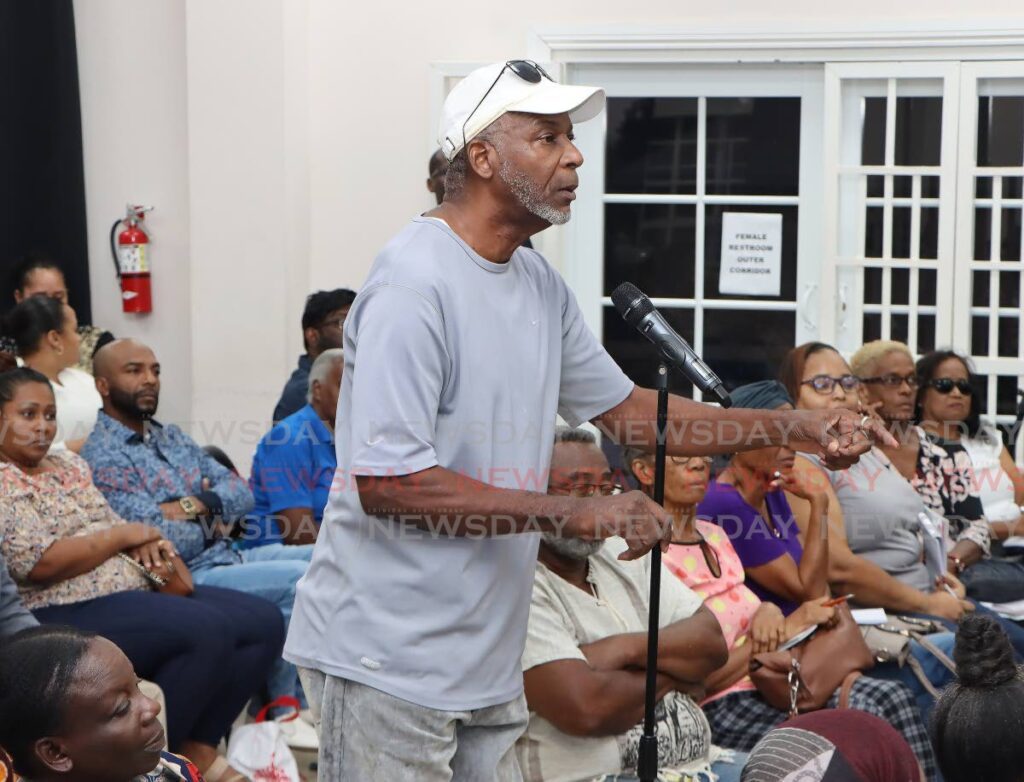Public patients upset at being shunted to go private

SEVERAL patients seeking treatment at public hospitals have instead faced being pushed towards the costly private health sector, a public consultation of the healthcare system was told on April 25 at Arima.
Complainants said hospital staff had variously cited long patient waiting lists plus shortages of staff and equipment as reasons to push patients to go private.
Amid lengthy waits for appointments, diagnostic tests like CT scans, and surgery, patients were approached by doctors and front-desk staff instead to see a private doctor, who was sometimes the same doctor at the public hospital.
Patients vented their frustration at a town hall meeting held by Parliament's Joint Select Committee (JSC) on Social Services, chaired by Independent Senator Dr Paul Richards.
Health Minister Terrence Deyalsingh, in an immediate reply to Newsday's query, referred us to Dr Neil Singh of the TT Medical Board (and Dr Simone Mc Fee of the TT Medical Association).
Deyalsingh said, "This was also the purpose of taking the Welch Report to a JSC which the Opposition did not support.
"This was the opportunity to ventilate these very issues in the public domain."
A female cardiology patient at Mt Hope Hospital publicly recounted her experiences.
"I have to do a major operation in June at Mt Hope Women's Hospital, so I need clearance."
She said she needed to get a stress echo cardiogram and another test.
"The doctor who was attending to me told me that the person who was doing the test at Mt Hope had left and they have not found a replacement doctor, that I would have to go private."
The costs of the two tests were respectively $700 and $2,500, she said.
"I have been calling all the medical clinics. It is $3,000 and up.
"This is the one time they actually said, 'Go to a private facility to get the tests done.'"
Richards asked if she had been referred to go elsewhere to do the test, but she said no.
Clarence Mendoza said he had faced an eight-nine-month wait seeking hospital treatment for his wife's dementia.
In the interim, a health-care assistant at that hospital had handed him a business card for a well-known private hospital, as he was told to go to see a doctor there, at an expected cost of $4,000-$5,000. He resented being told by public health staff not to bother to return to the public hospital because it was an eight-nine-month wait.
Mendoza said the card was given to him by "the intake person at the front desk." Ultimately he sent his wife to Canada for treatment, he related.
He said he had similarly been told by a dentist in a public hospital to go to a private dentist.
"It happened too many times."
Michelle Omar Leiba said she had visited an eye specialist at a public hospital, only to be told to visit that doctor in their private practice.
"We need to stop specialists from running hospitals how they want to," she said. "Put people who want to help us!"
The audience applauded.
She complained drugstores did not have particular CDAP drugs in stock, but had them for private purchase. Omar Leiba exclaimed, "Look how many new private medical clinics have come up!"
Richards said,"We know why it is happening. Put something in place so the gaps in the system are not exploited at the expense of you, the patient."
Darren Daniel reported his upset at visiting a hospital where a security guard had told him, "That ain't making sense. Go private."
Medical Council president Dr Neil Sing told Newsday on April 26 that complaints about patients being sent to the private sector have been made for many years. He said some patients agreed to go owing to their frustration at the public system.
He said the Medical Council's remit was to register, certify and discipline individual doctors, but not entities like a private hospital, although he abhorred any idea of a doctor's private calling cards being distributed at a public hospital,which he damned as "advertising."
Singh said the council could only act if it received a complaint about a particular doctor.
He said the council was a a quasi-judicial body, set up by an act of Parliament. Asked if he would like to see the council's remit expanded, he replied yes, but that the council's 14 recommended amendments to the Medical Board Act had been voted down by 80 per cent of the membership of the Medical Board.
Singh said US public hospitals got funding based on the number of patients they saw, but did not think Trinidad and Tobago's politicians were paying enough attention to ideas such as this.

Comments
"Public patients upset at being shunted to go private"